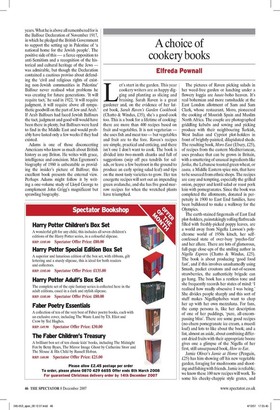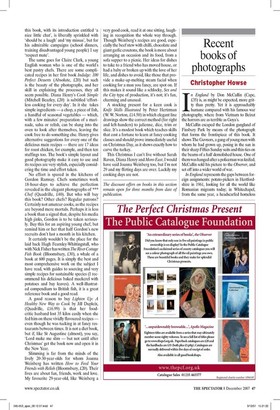A choice of cookery books
Elfreda Pownall Let's start in the garden. This year cookery writers are as happy digging and planting as slicing and braising. Sarah Raven is a great gardener and, on the evidence of her latest book, Sarah Raven's Garden Cookbook (Chatto & Windus, £35), she's a good cook too. This is a book for a lifetime of cooking: there are more than 400 recipes based on fruit and vegetables. It is not vegetarian — she uses fish and meat too — but vegetables and fruit are to the fore. Raven's recipes are simple, practical and enticing, and there isn't one I don't want to cook. The book is divided into two-month chunks and full of suggestions (snip off pea tendrils for salads, or leave a few beetroot in the ground to produce an early spring salad leaf) and tips on the most tasty varieties to grow. Her ten courgette recipes will sort out an impending green avalanche, and she has five good marrow recipes for when the wretched plants have triumphed.
The pictures of Raven picking salads in her weed-free garden or lunching under a flowery loggia are haute-boho heaven. It's real bohemian and more ramshackle at the East London allotment of Sam and Sam Clark, whose restaurant, Moro, pioneered the cooking of Moorish Spain and Muslim North Africa. The couple are photographed griddling kebabs and sowing and picking produce with their neighbouring Turkish, West Indian and Cypriot plot-holders in front of brightly-painted, dilapidated sheds. The resulting book, Moro East (Ebury, £25), of recipes from the eastern Mediterranean, uses produce that can be grown in Britain, with a smattering of unusual ingredients like farika, the Lebanese toasted green wheat, or zaata, a Middle Eastern spice mix, that have to be sourced from ethnic shops. The recipes are easy and tempting, especially the grilled onion, pepper and lentil salad or roast pork loin with pomegranates. Since the book was completed the allotments, donated in perpetuity in 1900 to East End families, have been bulldozed to make a walkway for the Olympics.
The earth-stained fingernails of East End plot-holders, painstakingly rolling flatbre ads filled with freshly-picked poppy leaves, are a world away from Nigella Lawson's polychrome world of 1950s kitsch, her selfconfessed state of over-busy 'psycho-fizz' and her allure. There are lots of glamorous, full-page close-ups of the smiling author in Nigella Express (Chatto & Windus, £25). The book is about producing 'good food fast', and if this involves unashamedly using Smash, packet croutons and out-of-season strawberries, the authenticity brigade can go hang. The book has a restless tone and she frequently records her states of mind: 'I realised how madly obsessive I was being.' She divides people sharply and this sort of stuff makes Nigellaphobes want to chop her up with her own mezzaluna. For fans, the camp persona is, like her description of one of her puddings, 'pure, all-encompassing bliss'. There are some good recipes (no-churn pomegranate ice cream, a muesli loaf) and lots to like about the book; and a list, almost an aside, about combining different dried fruits with their appropriate booze gives one a glimpse of the Nigella of her first, still unsurpassed book, How to Eat.
Jamie Oliver's Jamie at Home (Penguin, £25) has him showing off his new vegetable garden, foraging for mushrooms and shooting and fishing with friends. Jamie is reliable; we know these 100 new recipes will work. To some his cheeky-chappie style grates, and this book, with its introduction entitled 'a nice little chat', is liberally sprinkled with 'should be a laugh' and 'my missus', but for his admirable campaigns (school dinners, training disadvantaged young people) I say 'respect mate'.
The same goes for Claire Clark, a young English woman who is one of the world's best pastry chefs. There are some complicated recipes in her first book Indulge: 100 Perfect Desserts (Absolute, £20) but such is the beauty of the photographs, and her skill in explaining the processes, they all seem possible. Diana Henry's Cook Simple (Mitchell Beazley, £20) is subtitled 'effortless cooking for every day'. In it she takes simple ingredients — a chop, a piece of fish, a handful of seasonal vegetables — which, with a few minutes' preparation of a marinade, salsa or relish, can be slung into the oven to look after themselves, leaving the cook free to do something else. Henry gives alternative suggestions for every one of the delicious main recipes — there are 17 ideas for roast chicken, for example, and then ten stuffings too. The book's simple layout and good photography make it easy to use and its recipes are very stylish, especially considering the time and effort taken.
No effort is spared in the kitchens of Gordon Ramsay. Chefs sometimes work 18-hour-days to achieve the perfection revealed in the elegant photographs of *** Chef (Quadrille, £40). But who will buy this book? Other chefs? Regular patrons? Certainly not amateur cooks, as the recipes are beyond mere mortals. Perhaps it is less a book than a signal that, despite his media high jinks, Gordon is to be taken seriously. Buy this for an aspiring young chef, but remind him or her that half Gordon's new recruits don't last a month in his kitchen.
It certainly wouldn't be the place for the laid back Hugh Fearnley-Whittingstall, who with Nick Fisher has written The River Cottage Fish Book (Bloomsbury, £30), a whale of a book at 600 pages. It is simply the best and most comprehensive work on the subject I have read, with guides to sourcing and very simple recipes for sustainable species (I recommend his delicious baked mackerel with potatoes and bay leaves). A well-illustrated compendium to British fish, it is a great reference book and a good read.
A good reason to buy Lighten Up: A Healthy New Way to Cook by Jill Dupleix, (Quadrille, £16.99) is that her foodcritic husband lost 35 kilos easily when she fed him on these vividly flavoured recipes — even though he was tucking in at fancy restaurants between times. It is not a diet book, but if, like St Augustine (almost), you say, 'Lord make me slim — but not until after Christmas' get the book now and open it in the New Year.
Slimming is far from the minds of the lively 20-30-year-olds for whom Joanna Weinberg has written How to Feed Your Friends with Relish (Bloomsbury, £20). Their lives are about fun, friends, work and love. My favourite 29-year-old, like Weinberg a very good cook, read it at one sitting, laughing in recognition the whole way through. Though Weinberg's recipes are good, especially the beef stew with chilli, chocolate and giant garlic croutons, the book is more about arranging an occasion and its food, from a sofa supper to a picnic. Her ideas for dishes to take to a friend who has moved house, or had a baby or broken up with the love of her life, and dishes to avoid, like those that provide a make-up-melting steam facial when cooking for a man you fancy, are spot on. If this makes it sound like a schlocky, Sex and the City type of production, it's not; it's fun, charming and unusual.
A stocking present for a keen cook is Knife Skills Illustrated by Peter Hertzman (W W Norton, £14.50) in which elegant line drawings show the correct method (for right and left-handers) to julienne, dice, trim or slice. It's a modest book which teaches skills that cost a fortune to learn at fancy cooking classes and should prove immediately useful on Christmas Day, as it shows exactly how to carve the turkey.
This Christmas I can't live without Sarah Raven, Diana Henry and Moro East; I would have said Joanna Weinberg too, but I'm not 29 and my flirting days are over. Luckily my cooking days are not.
The discount offers on books in this section remain open for three months from date of publication.


























































 Previous page
Previous page